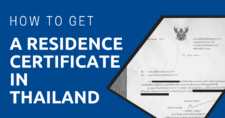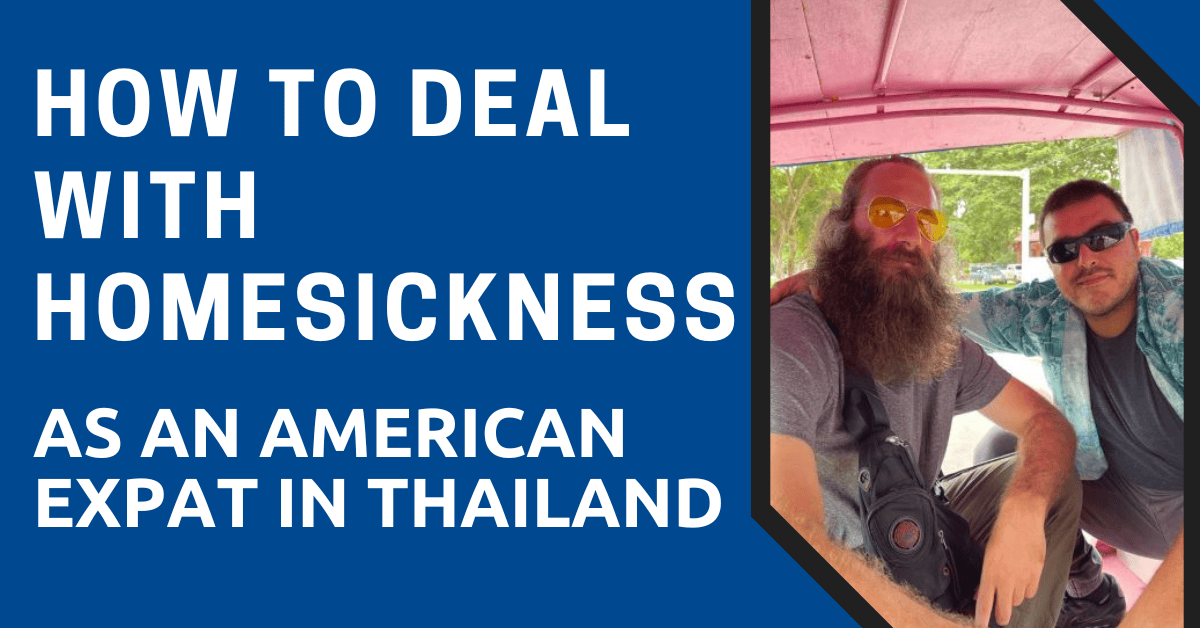
Three years ago, my wife and I made a life-changing decision to leave the United States and move to her home country, Thailand.
I anticipated that becoming an expatriate would be a thrilling and transformative experience, brimming with new adventures, insights, and perspectives, and a unique opportunity for personal growth.
However, I found that adjusting to life in a foreign country presented unique challenges.
Living abroad encompasses more than just a change of location; it’s a complex emotional journey.
Though often subtle, these emotions can be profound, often manifesting in feelings of homesickness.
When it comes to navigating these emotions, because each individual’s experience is unique, there is no universal guide for coping with homesickness.
Yet, by sharing my own story and the lessons learned along the way, though subjective and personal, I hope to offer both validation and inspiration, serving as a supportive guide for others as they navigate their own distinctive journeys.
"*" indicates required fields
Disclaimer: This article may include links to products or services offered by ExpatDen’s partners, which give us commissions when you click on them. Although this may influence how they appear in the text, we only recommend solutions that we would use in your situation. Read more in our Advertising Disclosure.
Contents
Am I Homesick?
“Am I Homesick?” This sentiment echoes in my mind as I navigate life far from the U.S.
Having lived abroad for three years, I find myself reflecting on the myriad emotions this journey has stirred.
Undoubtedly, I miss my friends and family. The familiar laughter, shared memories, and the comforting sense of belonging – these are irreplaceable.
Do I miss certain aspects of the U.S.? Certainly.
However, there are facets of life in the U.S. that I do not miss, elements that perhaps clash with my personal ideals and desired lifestyle.
Aspects such as certain cultural norms, which, while not inherently negative, were not in harmony with my aspirations.
Living abroad has been an eye-opener. It has allowed me to view my homeland with a lens of objectivity and appreciation for its positives while also understanding and accepting its flaws.
Although I am content with my decision to embark on this journey, a part of my heart still resides with the loved ones I left behind.
It’s a bittersweet sentiment that continues to shape my journey, reminding me that my roots and connections remain an integral part of who I am no matter where I go.
Home Is Where You Make It
While it may be cliché, “home is where you make it” profoundly resonates with me.
I believe that material possessions do not define or contribute intrinsic value to the concept of home.
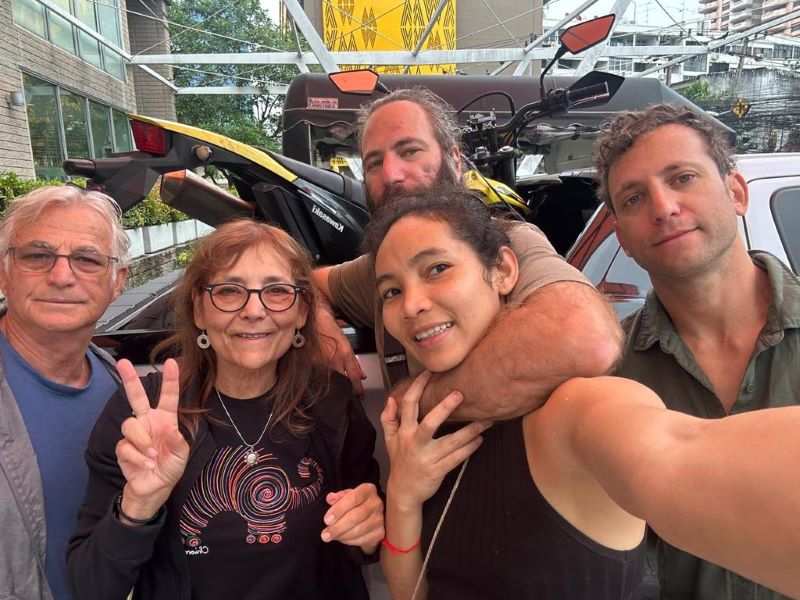
That said, my wife and I value only one thing—the companionship of our beloved dog, Zoe.
With the warm embrace of family, regardless of location, as long as we are together, we are “Home.”
Tips and Advice
Aligned with the philosophy of valuing individual experiences, I will not offer generic tips or prescriptive advice.
Instead, I choose to share my own personal journey and the pivotal moments that significantly impacted my life as an expat.
These reflections, drawn from my own experiences, are intended to provide insight and inspiration rather than direct guidance, acknowledging that every expatriate journey is distinct and deeply personal.
Building Community
When I first arrived in Thailand, my wife and I decided to live in her home province of Kamphaeng Phet.
For those unfamiliar with Kamphaeng Phet, it’s a tranquil province located in central Thailand.
It is known for many things; however, tourism is not one of them.
Even with my wife’s companionship and her family’s warm embrace, I found myself yearning for a sense of community and belonging.
Typically, in provinces and cities known for tourism, you will have no trouble finding other welcoming expats and English-speaking Thais eager to meet and welcome new people into their community.
Although the Thais of Kamphaeng Phet were very welcoming in their demeanor and intentions, there were very few, if any, who spoke English.
Regardless of the language barrier and the apparent lack of expats, I was determined to find new friends.
Putting Myself Out There
Admittedly, the prospects of finding new friends in Kamphaeng Phet initially looked bleak.
Nonetheless, I remained optimistic and committed to engaging with the community around me.
This determination led to a serendipitous encounter with a fellow expatriate, a teacher at the local high school.
Remarkably, against unexpected odds, she shared my Californian roots, which instantly sparked a connection between us.
This unexpected meeting was a turning point. She introduced me and my wife to her expat community.
This group soon became like an extended family to us.
Our bond with this community has outlasted our time in Kamphaeng Phet. Even though we have since relocated, the friendships we formed there remain an enduring part of our lives.
We cherish these relationships, returning to visit and rekindle our connections whenever we are in the area, a testament to the lasting impact of opening oneself up to new experiences and friendships.
Celebrating Holidays and Traditions
In Kamphaeng Phet, my expat community evolved into something akin to a cherished family, especially felt during holidays and traditional festivities that reminded us of our loved ones back home.
We began the fun tradition of potluck gatherings, where each of us would bring a dish representing a piece of our celebration from home.
The dining table became a canvas of global flavors, with each dish narrating a story from a different corner of the world.
Sharing these culinary experiences became a medium for exchanging cultural traditions and personal stories.
Although there was a palpable nostalgia for celebrating these occasions with our families back home, sharing our unique traditions within our community allowed us to honor those cherished memories while creating new ones.
This blending of past and present, of diverse cultures and shared experiences, came to symbolize the spirit of family in a foreign land.
It was a fusion that allowed us to feel connected not just to each other but also to the memories and traditions we each held dear.
Embracing Local Culture
While holding onto home traditions is comforting, immersing yourself in the local culture is equally important. It will go a long way in making your new country feel like home.
Embracing the local culture will not only distract you from homesickness but also enrich your expat experience.
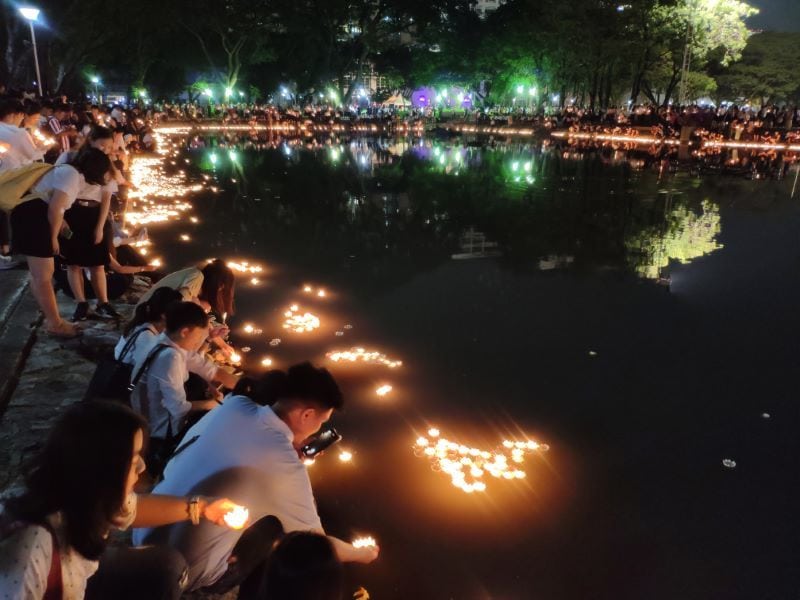
The more you engage with the culture, the more comfortable and less foreign it will feel.
Staying Connected
In my journey as an expat, the significance of staying connected with loved ones in the United States has been profound.
With advancements in modern technology, this task has become remarkably simple.
Video calls, in particular, have transformed from a mere convenience into an essential component of my life abroad.
These calls are not just avenues for casual conversation; they are vibrant lifelines that bring the familiar faces and voices of friends and family into my new world, allowing me to share moments and expressions that texts or emails cannot fully convey.
They serve as a digital bridge, effectively acting as a window into each other’s lives, ensuring that physical distance does not translate into emotional distance.
By actively including my loved ones in my daily life through these calls, I’ve maintained a strong sense of connection and have enriched my experience abroad, striking a harmonious balance between cherishing and nurturing my roots and continuing to bloom in my new life.
Encourage Visits
Inviting friends and family to visit you in your new country can be an enriching experience for both you and them.
Before their visits, I found it challenging to convey the depth and nuances of my life in Thailand.
The intricate cultural differences, which had become an integral part of my daily experience, were often lost in translation when relayed through mere words.
However, when my loved ones visited, they immersed themselves in the Thai culture and lifestyle, gaining a firsthand understanding of my new world.
This direct experience was invaluable in bridging the cultural divide. It transformed abstract concepts of my expatriate life into tangible, relatable experiences, deepening their appreciation of the cultural flavors and lifestyle changes I had embraced.
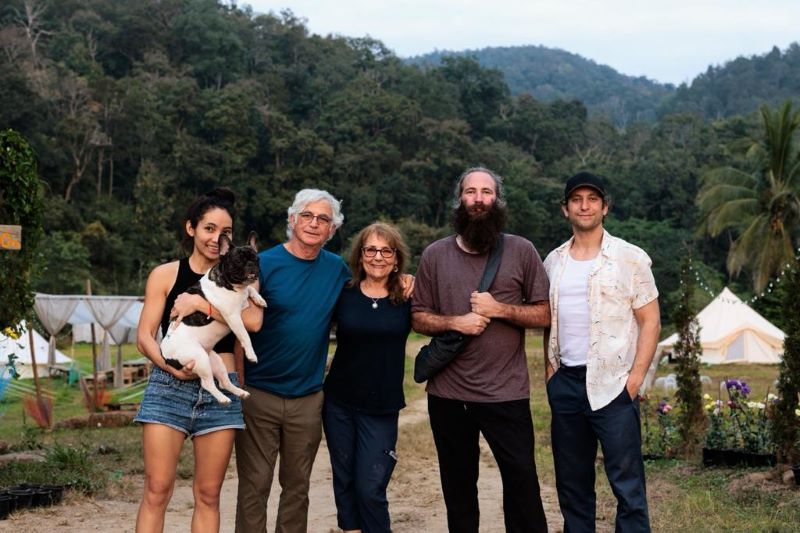
This shared experience enriched our conversations and understanding, creating a more meaningful and connected dialogue about our diverse worlds.
Sharing these culinary experiences became a medium for exchanging cultural traditions and personal stories.
Although there was a palpable nostalgia for celebrating these occasions with our families back home, sharing our unique traditions within our community allowed us to honor those cherished memories while creating new ones.
This blending of past and present, of diverse cultures and shared experiences, came to symbolize the spirit of family in a foreign land.
It was a fusion that allowed us to feel connected not just to each other but also to the memories and traditions we each held dear.
Embracing Technology
In addition to bridging the gap with loved ones, technology has been a gateway to cultural continuity, keeping me attuned to the evolving landscape of media and entertainment.
It has allowed me to stay abreast of the latest films, podcasts, videos, and shows, keeping me connected to the cultural pulse I once knew.
More than that, it has given me the comfort of revisiting cherished shows and movies from my past — those familiar stories and characters that evoke laughter and joy.
In moments of nostalgia or when I feel a tinge of melancholy, this access to familiar entertainment acts as a soothing balm, uplifting my spirits and providing a sense of home away from home.
However, it’s important to acknowledge that technology, while a boon in many respects, can also present challenges.
It often acts as a double-edged sword, especially in its capacity to inundate us with the less savory aspects of the media.
The constant stream of information, while keeping me connected, can sometimes become overwhelming, particularly when it’s saturated with negative news or sensationalism.
This deluge of information requires a mindful approach to consumption, ensuring that the benefits of staying informed and entertained do not come at the cost of mental peace.
As such, while technology serves as a bridge to cultural familiarity and a source of comfort, it also demands a judicious engagement to safeguard against the potential for information overload and the intrusion of negativity into my expatriate experience.
Give It Time
Finally, getting adjusted is a process that takes time.
Settling into a new country is gradual, and it is okay to have moments that feel overwhelming.
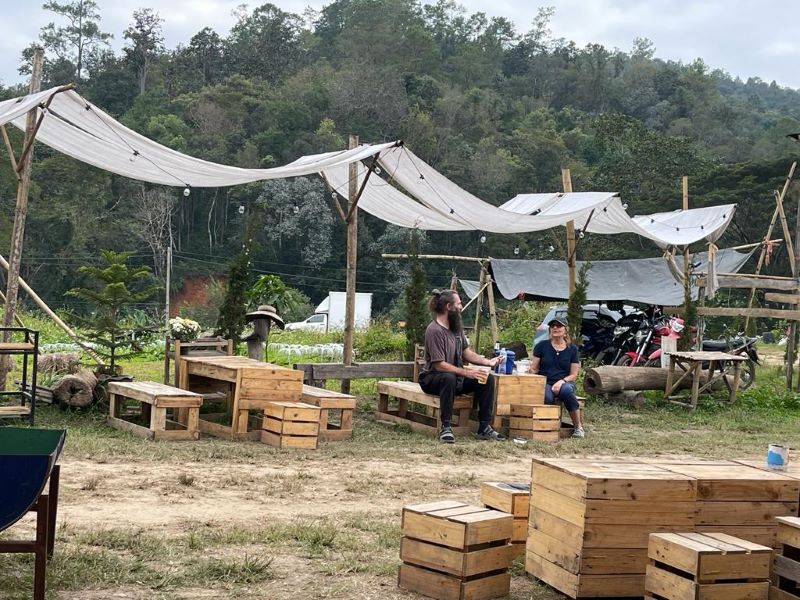
Patience is key when navigating through this life transition.
The time it takes to transition to a new culture will be unique for everyone.
My advice is not to focus on a specific time limit or the final results but to appreciate the process and embrace the journey.
Now, on to You
Home, in many ways, is a state of mind. Having lived in Thailand for three years, I’ve come to see it as my haven, and I am happy to call it my home.
Remember, it’s not about replacing your home in the U.S. but about expanding your concept of what home means.
Ultimately, despite the differences inherent in other cultures, what stands out is the universal essence of humanity: the desire for connection, understanding, and a sense of belonging.
As global citizens, our shared experiences, respect, and mutual understanding pave the way for a more interconnected and harmonious world.



